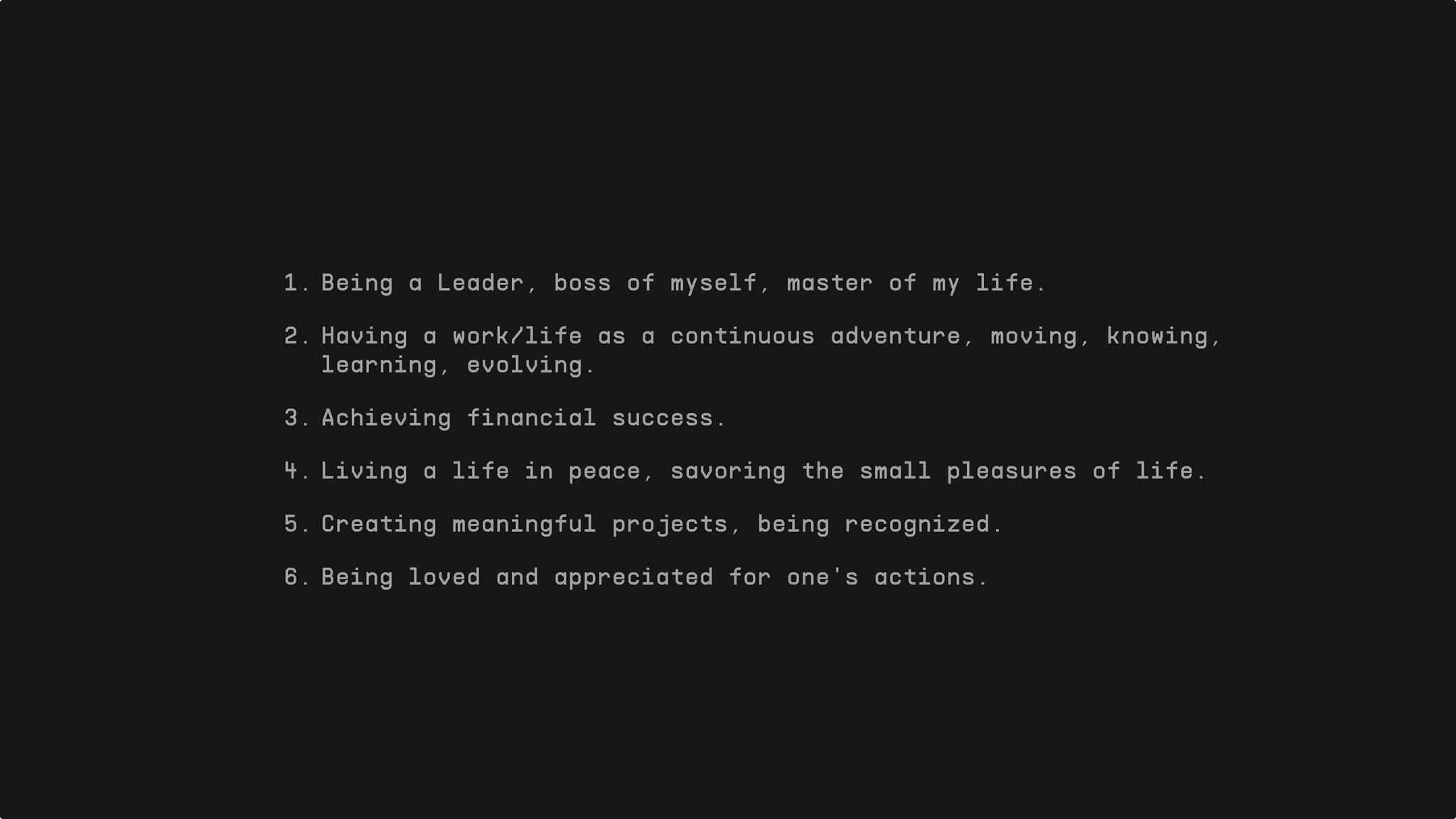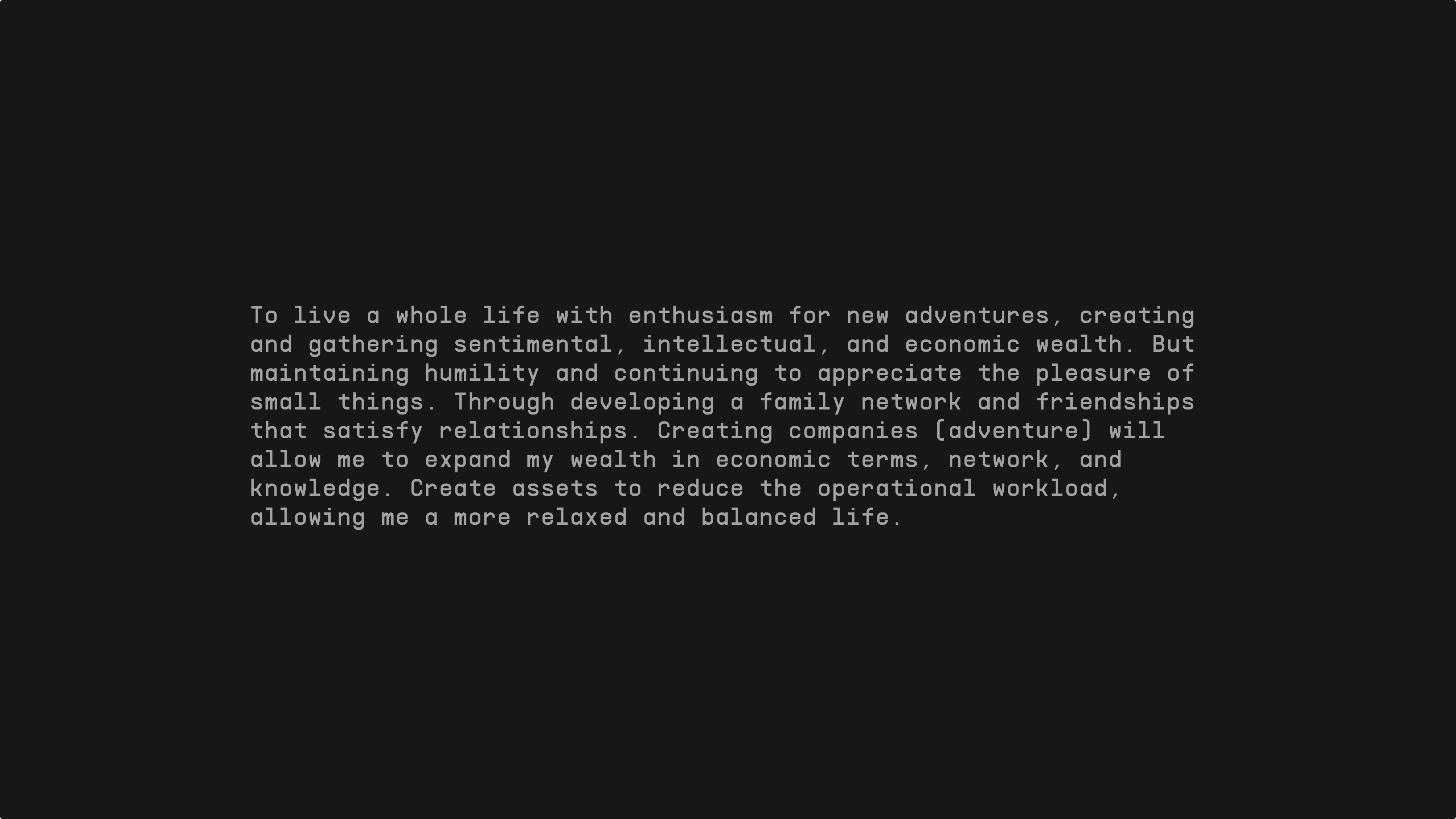Define our own mission
Creating a coherent path to achieve balance and happiness
Confusion, Distractions, and False Objectives
I’ve often found myself bouncing from one activity to another, chasing goals I didn’t believe in, with dynamics that didn’t reflect my way of being.
I’ve often found myself scrolling through Instagram, accessing other people’s lives, seeing trips, cars, luxury hotels, wondering if I was doing enough, leading me into a competition that didn’t belong to me, with people I didn’t know, whose background and starting point I was unaware of. Not knowing if what they were sharing was real, or a construction designed to impress.
An engine that does nothing but fuel envy, competition, and a desire to appear.
But what’s the result? The result is that we will have a perpetual dissatisfaction because we see our lives in comparison to those of strangers whose stories we don’t know.
Moreover, we will believe that we need things, desire results, that don’t belong to us.
Already more than 2000 years ago, Marcus Aurelius in “Meditations” said:
Do not spend the rest of your life looking at the actions of others, prying into what someone is doing, worrying about what they declare or desire. Turn away from what you owe others, to your better self. Just as in the succession of thoughts it’s better to let go of everything that is idle and inconsistent, especially slander and indiscretion. […]
It’s better to think about something that you wouldn’t be embarrassed to tell if someone asked you to express your thoughts.
In this, your simplicity and benevolence, your positive thoughts will immediately shine through, and you won’t be haunted by fantasies concerning enjoyment, competition, jealousy, ambiguity, and other such things, which should make you ashamed if only it were shown that they belong to you.
These distractions do nothing but cloud our vision, diluting our nature into that of others.
According to Seneca, life is not short at all, because “in reality, it’s not that we have little time, we waste so much of it, and the life we are given is long enough to accomplish great things”.
The feeling of life’s brevity is the child of the thousand activities that trap us without giving us any gratification in return, matters that we blindly continue to accept to carry out, telling ourselves that one day, tomorrow, in a hypothetical future, we will be able to change things and give a turning point to our existence.
Thinking About One’s Purpose and Defining One’s Path
I wrote “thinking” because we often forget about it.
We have so many tools that solve problems for us, like Google, ChatGPT, that thinking has become superfluous.
I tried to understand what I wanted, but it’s not easy to extract from one’s conscience and understand what one wants to achieve in life.
The questions we ultimately ask ourselves are the same ones the Greeks began asking in the 5th century BC, and since then we have all asked ourselves: what is the good life? How do you define it? How do you live it? Over the centuries, people have asked the same questions:
Why am I here? What am I doing? Why does it matter? What is my purpose? What’s the point of all this? What gives life meaning? What makes your life useful or valuable? How does your life relate to others in your family, your community, and the world? What do money, fame, and personal fulfillment have to do with a satisfying life? How important are experience, growth, and achievement in your life?
To build a happy life, we should work on one thing: coherence. A coherent life is one lived in such a way that you can clearly connect the dots between:
Who you are → What you believe in → What you’re doing
Defining a Statement of Intent
Personal Purpose
Purpose, Why, or Leading Values, in literature you find variations in nomenclature, but the content is pretty much the same. They are that set of values that guide you forward and help you determine your goals, which if achieved will satisfy your needs: what does your motivation derive from?
It’s important to try to understand what your own, deep needs are to satisfy.
What’s the purpose? What’s the reason? What do you believe in? Why do you exist? Why do you get up in the morning? And why should anyone care?
According to Sinek, “finding your why” means finding your purpose: the unique belief that inspires you to do the work you choose to do and consistently live your life with purpose.
A personal why statement is a clear and concise statement that includes your core values, main priorities, and who you’re working for. It narrows your focus, allowing you to spend your time and energy where it matters most.
Criteria for choosing which are the best choices for me:

On this note, I suggest reading Ray Dalio’s “Principles” and trying to use his guided journal.
Personal Mission
A mission statement defines, in business, the company’s business, its objectives, and its approach to reach those objectives. Translating it to the personal level, it becomes the definition of one’s concept of success.
The personal mission statement is a brief declaration, usually one or two sentences, that indicates the direction in which you intend to move your life. It’s like a compass that helps you stay on track, directing you in the direction you want to go.

Let’s build a bold future.